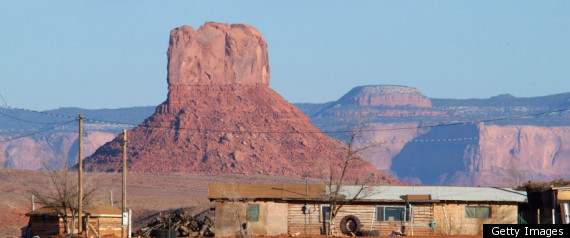 FLAGSTAFF, Ariz. -- The Navajo Nation has settled its allegations that a coal mining company conspired with others to cheat the tribe out of hundreds of millions of dollars in royalties.
FLAGSTAFF, Ariz. -- The Navajo Nation has settled its allegations that a coal mining company conspired with others to cheat the tribe out of hundreds of millions of dollars in royalties.The tribe and Peabody Energy announced a settlement Thursday that stemmed from a 1999 lawsuit the tribe filed in federal court, but the terms are confidential.
The Navajo Nation had sought to reform the leases granted to Peabody some 40 years ago and recover what it claimed was $600 million in lost coal royalties. The U.S. Supreme Court ruled against the tribe in a similar lawsuit filed against the federal government.
"The nation is pleased that the issue is now behind us," said Navajo Department of Justice attorney William Johnson. "The revenue that the companies provide will allow the nation to assist its elderly, provide scholarships for the students and provide services for the Navajo people."
Representatives of Peabody, and the Salt River Project and Southern California Edison – two utilities that benefit from power plants fed by the coal Peabody mines from the Navajo and Hopi reservations in northeastern Arizona – echoed that sentiment.
"Mining on Black Mesa is a major economic staple, contributing more than $12 billion in direct and indirect economic benefits to the region since the operations began," said G. Brad Brown, a Peabody senior vice president.
A federal judge dismissed the lawsuit with prejudice, months after the parties began another round of mediation to try to resolve their differences. Claims brought by the Hopi Tribe, which sought unspecified damages and reformation of its lease with Peabody, were dismissed last year, according to court documents.
The Navajo Nation approved a lease for Peabody in 1964 that was worth 37.5 cents a ton for the tribe, about 2 percent of gross proceeds.
When the lease came up for renewal 20 years later, the Navajo Nation sought a higher royalty rate of 20 percent. That effort was backed by the Navajo-area U.S. Bureau of Indian Affairs director.
But before the rate was set, then-Interior Secretary Donald Hodel met with a Peabody lobbyist and blocked the rate, forcing the tribe back into negotiations. The tribe, not knowing what became of its proposal, later agreed to a 12.5 percent royalty, the then-standard rate for federal coal leases.
Navajo lawmakers recently approved a royalty reopener agreement with Peabody that maintained the 12.5 percent rate but increased scholarship payments to the tribe and provided for bonus payments.
"The leases will still continue," Johnson said.
Origin
Source: Huffington
No comments:
Post a Comment